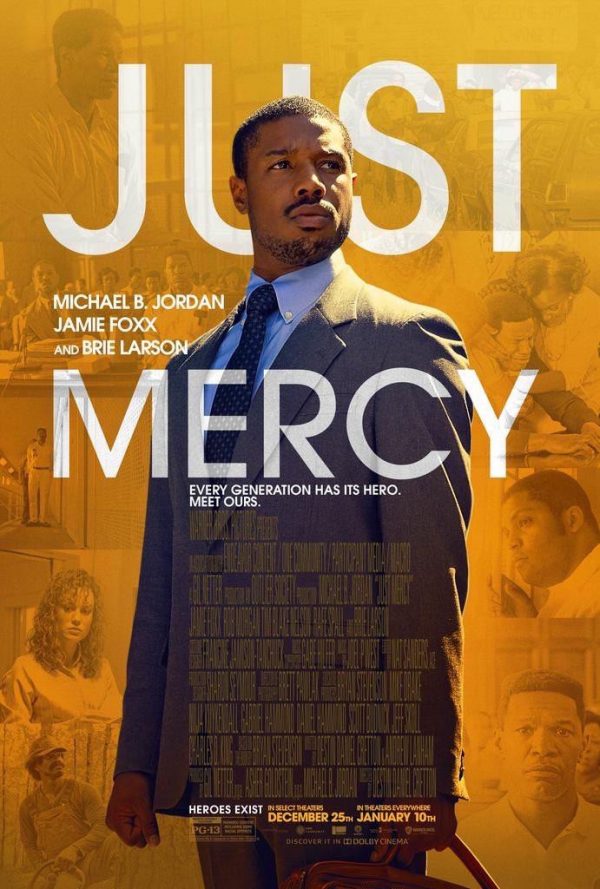Just Mercy, 2019.
Directed by Destin Daniel Cretton.
Starring Michael B. Jordan, Jamie Foxx, Brie Larson, O’Shea Jackson Jr., Rafe Spall, Rob Morgan, Tim Blake Nelson, Drew Scheid, Steve Coulter, Mary Kraft, Rhoda Griffis, J. Alphonse Nicholson, and Karan Kendrick.
SYNOPSIS:
World-renowned civil rights defense attorney Bryan Stevenson works to free a wrongly condemned death row prisoner.
A worthy story and skilled cast and crew does not inherently a great film make, as evidenced by Destin Daniel Cretton’s (Short Term 12, The Glass Castle) shockingly average third feature Just Mercy.
Cretton’s film depicts the 1986 incarceration of black American Walter McMillian (Jamie Foxx), who has the murder of a young white woman hastily pinned on him by the Alabama police, causing him to be convicted and sentenced to death. Working with young, optimistic defense attorney Bryan Stevenson (Michael B. Jordan), McMillian hopes that his wrongful conviction can be overturned.
And as ripe as that setup might seem for a barnstorming, awards-courting legal drama, Cretton far too often settles for shopworn, over-familiar genre tropes and trite, overly expository dialogue to convey both historical context and legal jargon.
Just Mercy’s opening moments hit the ground running and suggest a film with no time to waste, but almost immediately after McMillian is sent to prison in those first few minutes, the pic trips and stumbles for most of what remains of the first act. The first 45-or-so minutes of this movie are, to be blunt, a bit of a slog, defined by overly prosaic dialogues and flat camera set-ups which too often recall an unfussed made-for-TV movie.

Even with Jamie Foxx and Michael B. Jordan conversing in numerous scenes, there’s a peculiar detached coldness to many of these early meetings, and it isn’t until the film’s second reel that it begins to find a compelling rhythm. At this point the urgency of McMillian’s situation becomes deathly clear, and the film is energised quite dramatically by the arrival of Tim Blake Nelson as an inmate who holds the winning piece of the defense’s puzzle.
Perhaps it’s a bit of a shame that, in a film entirely concerned with racial oppression, it’s a white actor who storms into the film like a hurricane and damn-near runs away with it, though that’s entirely down to Cretton’s script and direction rather than any wrongdoing on Foxx or Jordan’s part.
To their respective credit, Foxx commands the screen whenever he’s on it – which is decidedly less than you might think – while Jordan, if asked to be a picture of reserved stoicism for most of the runtime, nevertheless brings a dignified likeability to his character. The same sadly can’t really be said for Brie Larson, who plays Stevenson’s co-worker Eva Ansley, a bizarrely underwritten character who poor Larson tries to breathe life into, but rarely rises above prop status.
Some of the most effective casting, meanwhile, is apparent in the smaller roles of McMillian’s fellow inmates we encounter throughout the film. Rob Morgan is remarkable as Herbert Richardson, an older inmate whose execution date looms near, while in more famous stakes, O’Shea Jackson Jr. provides a vague dose of levity as McMillian’s other cell neighbour Anthony Ray Hinton.
If so much of this review makes Just Mercy sound crushingly underwhelming, the sheer emotion of McMillian’s fight for freedom does have an undeniable pull, and one which the film increasingly takes advantage of the longer it goes on – and, with a bloated 136 minute runtime, it does go on.
The injustices suffered by McMillian are naturally myriad and systemic, and the film is at its best when angrily drawing attention to them. It’s practically impossible for any liberal-skewing viewer not to stew in rage as McMillian is stonewalled by a hyper-bureaucratic and thoroughly racist legal institution, and one where oppressing black people and other minorities is merely the status quo.
This aspect of the film is best realised through Rafe Spall’s prosecutor Tommy Chapman, a character who at first resembles a caricature of a racist conservative legal, though in the film’s later patches at least develops into something slightly more nuanced and interesting. Chapman is ultimately perhaps an optimistic emblem for the white man’s potential to take a step back and assess their own privileges and prejudices, and the talented Spall helps make the character human while not at all letting him off the hook.
I sat in a busy screening of the film and, when it concluded, many audience members around me were audibly sniffing and sobbing, so it’s clear that Just Mercy‘s broad drama will be deeply affecting to a great many. But Cretton’s oddly uninspired, ho-hum approach to his characters, their scenarios, and the important anti-death penalty message, wrapped in an overall mediocre visual package – not that this needed anything special – left me appreciative of having learned McMillian’s story, yet not even close to fighting back tears.
On one hand this is a “good enough” movie that certainly feels transparently conceived with awards in mind, yet also not one that’s remotely nuanced or well-crafted enough to do full justice to either its true story or the cast acting it out.

The snoozy first act very nearly collapses the entire thing, though as is an enormous rarity in the world of film, a dodgy opening reel gives way to decidedly sturdier filmmaking in the remaining 90 minutes. If you’re a particular fan of the talents involved, you’ll find moderate enjoyment here, but otherwise, you might feel a creeping sense of déjà vu.
A disappointingly by-the-book legal yarn given the huge talents involved, though the first-rate cast barely prises enough emotion from the boilerplate dramatics to make it scarcely worthwhile.
Flickering Myth Rating – Film: ★ ★ ★ / Movie: ★ ★ ★
Shaun Munro – Follow me on Twitter for more film rambling.















